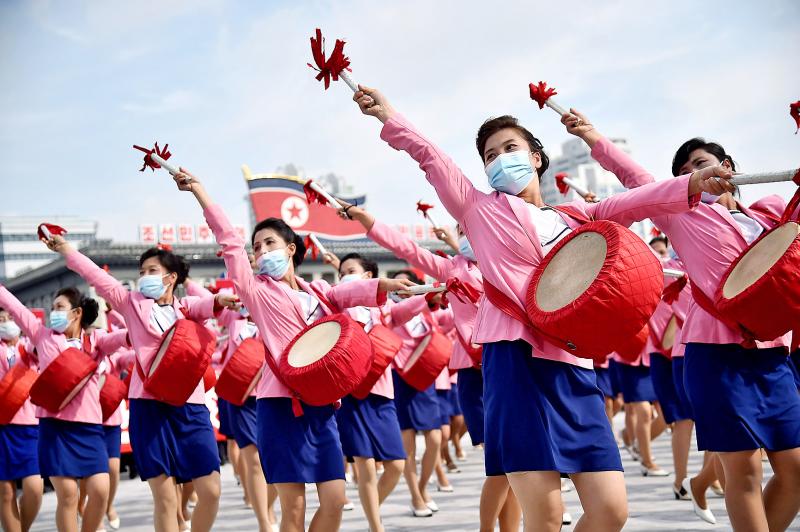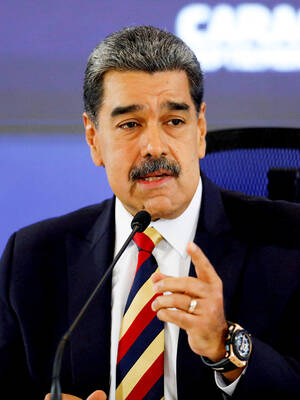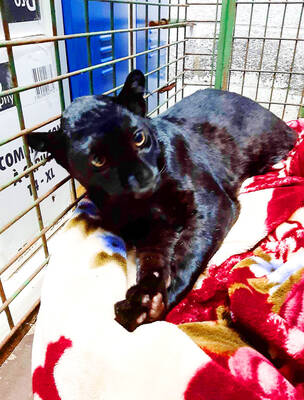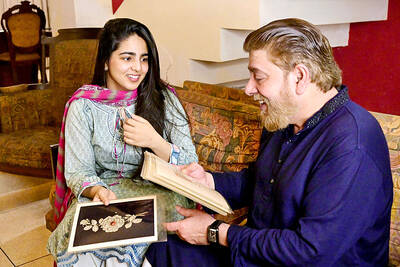Often seen grinning at a missile launch or in command of lengthy official meetings, North Korean leader Kim Jong-un has offered a glimpse of a different image — emotional and apologetic.
At a weekend military parade where he showed off Pyongyang’s latest and largest intercontinental ballistic missiles, Kim’s voice trembled momentarily as he spoke of “tears of gratitude” for his people’s efforts.
He repeatedly and effusively thanked the public and military for their loyalty, and for remaining healthy in the face of the global COVID-19 pandemic, which he said had not caused a single case in North Korea.

Photo: AFP
That has come at a price: Kim closed North Korea’s borders in January to stop COVID-19 entering the nation, a move which analysts say has exacerbated the effects of international sanctions imposed over its banned weapons programs.
The camera cut away after Kim lauded volunteers who helped with disaster recovery efforts, returning to show him laying down a handkerchief and putting his glasses back on, as if he had been wiping his eyes.
At one point he went as far as apologizing for failing to meet expectations.
“Our people have placed trust, as high as the sky and as deep as the sea, on me, but I have failed to always live up to it satisfactorily. I am really sorry for that,” Kim said, according to a transcript from the Korean Central News Agency.
It was his second apology in a matter of weeks: Seoul’s presidential Blue House said that North Korea’s ruling party last month told it that Kim was “very sorry” over the killing of a South Korean in Pyongyang’s waters.
At the weekend parade, Kim also pledged to his citizens to do better.
“I solemnly swear once again in this place that I will live up to the people’s trust without fail, even if my body is torn and crushed to pieces,” he said.
In some ways the sentiment is in keeping with North Korean orthodoxy: Pyongyang consistently portrays the Kim family, who have led the nation for more than 70 years, as heroic self-sacrificers who devote their lives to the service of its people.
However, the acknowledgement of personal fallibility is a marked contrast to the superlative-laden propaganda that exalted his grandfather Kim Il-sung, North Korea’s founder.
Under Kim Jong-un, who inherited power when his father Kim Jong-il died in 2011, observers say North Korea has taken some small steps away from the personality cult of the past — portraits of Kim Jong-un are extremely rare.
Rachel Minyoung Lee, a former North Korea analyst with the US government, described the parade as a “departure from the norm.”
Kim Jong-un’s speech was “about the people” and “carefully calibrated to come across as genuine and relatable,” Lee said. “This is the latest example of North Korea’s changing propaganda strategy of conveying their message in a more entertaining and relatable manner.”
Analysts differed on the sincerity of the declaration by Kim Jong-un, whose regime is accused of widespread human rights abuses and who has ruthlessly asserted his grip on power, at times purging even close relatives.
“First of all he is a politician, it means he is a good actor,” said Andrei Lankov of the Korea Risk Group.
However, Kim Jong-un “really would like his people to live well,” Lankov said. “Of course regime survival is far more important for him than survival of poor farmers in distant provinces. Missiles come first, but he doesn’t forget about farmers.”
Former CIA analyst Soo Kim suggested that Kim Jong-un could be “resorting to tears to compensate for his failure to deliver his basic promises to his people.”
“The expectation, of course, is that the population will buy into this act,” she said.
In South Korea, the JoongAng Ilbo in an editorial dismissed Kim Jong-un’s performance as “crocodile tears.”
“Kim suddenly turned euphoric upon looking at the super-sized intercontinental ballistic missiles in the military parade,” the newspaper wrote.

VENEZUELAN ACTION: Marco Rubio said that previous US interdiction efforts have not stemmed the flow of illicit drugs into the US and that ‘blowing them up’ would US President Donald Trump on Wednesday justified a lethal military strike that his administration said was carried out a day earlier against a Venezuelan gang as a necessary effort by the US to send a message to Latin American cartels. Asked why the military did not instead interdict the vessel and capture those on board, Trump said that the operation would cause drug smugglers to think twice about trying to move drugs into the US. “There was massive amounts of drugs coming into our country to kill a lot of people and everybody fully understands that,” Trump said while hosting Polish President

A French couple kept Louise, a playful black panther, in an apartment in northern France, triggering panic when she was spotted roaming nearby rooftops. The pair were were handed suspended jail sentences on Thursday for illegally keeping a wild animal, despite protesting that they saw Louise as their baby. The ruling follows a September 2019 incident when the months-old feline was seen roaming a rooftop in Armentieres after slipping out of the couple’s window. Authorities captured the panther by sedating her with anesthetic darts after she entered a home. No injuries were reported during the animal’s time on the loose. The court in the

Japan yesterday heralded the coming-of-age of Japanese Prince Hisahito with an elaborate ceremony at the Imperial Palace, where a succession crisis is brewing. The nephew of Japanese Emperor Naruhito, Hisahito received a black silk-and-lacquer crown at the ceremony, which marks the beginning of his royal adult life. “Thank you very much for bestowing the crown today at the coming-of-age ceremony,” Hisahito said. “I will fulfill my duties, being aware of my responsibilities as an adult member of the imperial family.” Although the emperor has a daughter — Princess Aiko — the 23-year-old has been sidelined by the royal family’s male-only

For more than a century, the fate of the dazzling Darya-e-Noor diamond has been sealed inside a bank vault — a mystery that haunts Khawaja Naim Murad, great-grandson of the last prince, or nawab, of Dhaka. Locked away in 1908, were the family’s heirlooms lost during the violence at the end of British rule in 1947? Did they survive Bangladesh’s war of independence in 1971 and the string of coups that followed, or are they still safe, dusty, but untouched? Many suspect that the jewels are long gone and officials at the state-run bank hesitate to simply open the vault, fearing that they